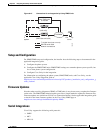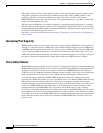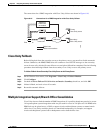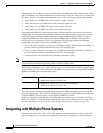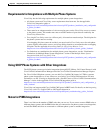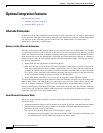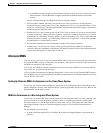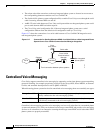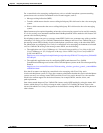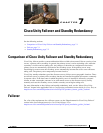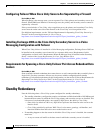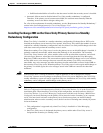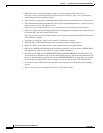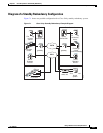
6-35
Design Guide for Cisco Unity Release 5.x
OL-14619-01
Chapter 6 Integrating Cisco Unity with the Phone System
Centralized Voice Messaging
For a centralized voice messaging configuration to exist, a suitable inter-phone system networking
protocol must exist to deliver a minimum level of feature support, such as:
• Message waiting indication (MWI).
• Transfer, which ensures that the correct calling/called party ID is delivered to the voice messaging
system.
• Divert, which ensures that the correct calling/called party ID is delivered to the voice messaging
system.
Other features may be required depending on how the voice messaging system is to be used (for example,
if it is also serving as an automated attendant then Path-Replacement will be needed as this feature will
prevent calls from hair-pinning).
Not all phone systems can serve as a message centre PINX. In this case, customers may wish to consider
relocating Cisco
Unity to Cisco Unified Communications Manager and have Cisco Unified CM act as
the message centre PINX with the circuit-switched phone system now acting as the subscriber PINX.
For information on configuring Cisco Unity in a centralized voice messaging environment to be hosted
on Cisco Unified
CM serving as the message centre PINX, see the following:
• The application note Cisco CallManager 4.1-Voicemail Interoperability: Cisco Unity 4.0(4) with
Cisco CallManager 4.1(2) Configured as Message Center PINX Using Cisco Catalyst 6608 T1
Q.SIG with MGCP at
http://www.cisco.com/application/pdf/en/us/guest/products/ps5820/c1072/ccmigration_09186a008
03cad8f.pdf.
• The applicable application note for configuring QSIG trunks between Cisco Unified
Communications Manager and various circuit-switched phone systems on the Cisco Interoperability
Portal at
http://www.cisco.com/en/US/netsol/ns728/networking_solutions_products_generic_content0900ae
cd805b561d.html.
Note that if customers are deploying centralized voice messaging with Cisco Unity and a
circuit-switched phone system, it is up to the customer to determine whether the circuit-switched phone
system can serve as a message center PINX on which Cisco
Unity can be hosted. If so, the customer
should also confirm support for the desired features, for example, MWIs, transfer, divert, and
path-replacement.
Inter-cluster trunks between Cisco Unified CM clusters can be QSIG enabled by using the Annex M.1
feature, which allows Cisco
Unity to integrate with a single Cisco Unified CM cluster. Ports in the
cluster with which Cisco
Unity is integrated can be dedicated to turning MWIs on and off for phones in
other clusters.



